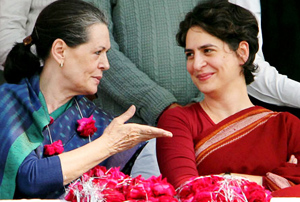New Delhi, Aug 09: There is little doubt that by declining to join "active" politics, Priyanka Gandhi-Vadra will not only cause huge disappointment to her growing body of supporters in the Congress, but may also undermine the party's chances of revival.
To her followers, she represents the last and perhaps only hope of the party's recovery following its demoralizing defeat in the April-May general elections.
Accustomed to looking only at the Nehru-Gandhi family to lead them, Priyanka's supporters evidently turned to her when it seemed abundantly clear that neither party president Sonia Gandi nor vice president Rahul Gandhi was the answer to the organisation's travails.
While Sonia Gandhi has been largely spared any direct criticism, except from writers of books on current affairs, Rahul Gandhi has been the target of considerable carping, ranging from being called a "joker" to being surrounded by rootless wonders with little understanding of Indian politics.
However, there was a suggestion that both mother and son should take a two-year sabbatical, an unusual observation in a party which has acquired the reputation of being run like a feudal household with its retinue of servile courtiers.
This was also the closest any party member had ever come to saying that Sonia Gandhi was not the answer to the party's problems and that the organization could perhaps be better off if she kept out of the way for some time along with her darling son.
In this depressing context, Priyanka Gandhi-vadra aroused the most expectations. The reasons have long been obvious. Between the three - mother, son and daughter - Priyanka has been seen as the most naturally endowed with leadership qualities in being articulate and, most importantly, without any hangups in the matter of reaching out to the people.
Because of her open, extrovert nature, party cadres and ordinary people felt at ease in her company. In a strange way, she combined the personal charisma of her grandmother, Indira Gandhi, without the former prime minister's intimidating regal presence.
Rahul Gandhi, unfortunately, does not have any of these qualities. He not only appears to be a reluctant politician as his poor record of attendance in parliament and prolonged periods of absence from the country showed his aloofness inhibited even Congressmen from approaching him, let alone the ordinary people.
Some of his ideas have also seemed woolly. His charge, for instance, that most of the parties are run by a few has never been taken seriously because he himself belongs to perhaps the most exclusive of such coteries.
Notwithstanding his inability to provide inspirational leadership, it can seem odd that Sonia Gandhi insisted on pushing him to the forefront, even egging him on to be aggressive when he barged into the well of the Lok Sabha to protest against the speaker's conduct.
If anyone was looking for signs of confirmation of Sonia Gandhi's wish to pass the baton to her son, that uncharacteristic intervention in parliament was the moment. It is probably not a coincidence that within two days of the incident, Priyanka announced her intention to stay away from active politics, which virtually amounted to her "retirement".
The haste may have been occasioned by the announcement by a relatively unknown Congress spokesperson that all three members of the dynasty will be in the leadership. There have also been reports that Priyanka may be made general secretary in charge of the party in Uttar Pradesh.
These statements probably reflected the wishful thinking of Priyanka's supporters rather than any decision taken by the party. But, arguably, the Congress president did not want the speculations to spread any further.
There are several reasons for putting a lid on the rumours. One is that Rahul's image will suffer if there is a clamour for Priyanka to play a major role. As it is, the dauphin is not seen by a majority of the party men as someone who can reverse the present trend of the Congress's decline.
Even outside the party, he is seen as the poor little rich boy who has been forced to do the family's, and his mother's, bidding when his heart is not in the job since he is palpably not a political animal. As the former Congressman, Natwar Singh, has said in his autobiography, Rahul does not have "fire in the belly".
Another reason why all the gossip had to be scotched is the close personal relations between brother and sister. Priyanka evidently realized that if she is pushed to the forefront by a section of the party men, a rift cannot but appear between the siblings which will be highly distressing for everyone in the family.
There is also a third reason. For all her popularity among Congressmen, Priyanka is hobbled by the allegations against her husband's business ventures.
This is a major disadvantage. After all, her father's government was brought down by the Bofors howitzer scandal in 1989 and the Manmohan Singh government's downfall can also be attributed to the charges of corruption which it faced.
Even then, Priyanka's decision means that the Congress is back to square one, depending wholly on Sonia and Rahul to extricate it from the political quagmire. The prospect doesn't seem bright.






Comments
Add new comment